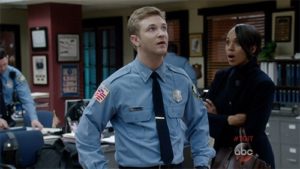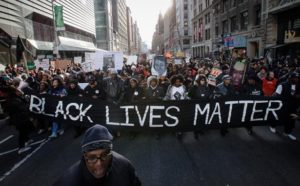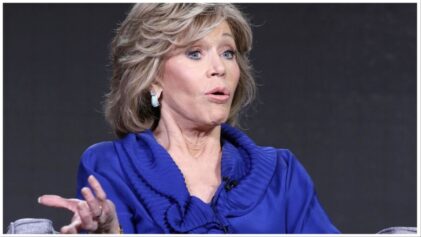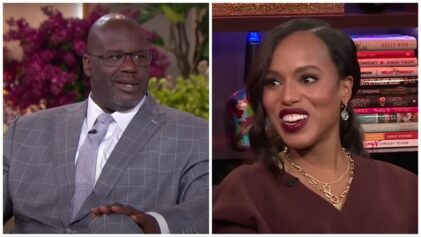
The recent string of police shootings taking the lives of unarmed Black men has had the nation in a state of unrest.
Chants of “Black lives matter” never seem to fade away and now, more than ever, consumers are pushing for Black voices to be heard even in the realm of entertainment.
Television phenomena like Scandal’s “The Lawn Chair” episode are exactly why.
The episode touched on a number of elements including Oliva Pope’s return to work and the future of Mellie’s newfound political aspirations.
The episode’s anchor, however, was the death of an unarmed Black teen who was fatally shot by a white officer who claimed he was simply trying to defend himself.
It’s a story that is all too familiar for the Black community.
The episode immediately drew on the emotions still running high after the nation bid farewell to Black men like 18-year-old Michael Brown in Ferguson, 12-year-old Tamir Rice in Cleveland, 17-year-old Trayvon Martin in Sanford, Florida, Staten Island father Eric Garner, 22-year-old John Crawford III near Dayton, Ohio and so many more.
These days, it seems like the list of stolen lives is growing too long for any banner to hold or any memorial to capture.
In addition to witnessing the deaths of these men, however, the nation also witnessed the range of emotions that follow.
Scandal, somehow, managed to capture it all.
The emotional toll taken on a heartbroken parent, the frustrations from a community that has finally grown weary of years of oppression and being the targets of police brutality, and even the racially-charged sentiments from the police officers that insist they have done no wrong are all present in the episode.
In less than an hour, the talented team of writers fully encapsulated both the racist attitudes of many white people following such events and the sick twisted reality that is formed when the “not all cops are bad cops” ideology is twisted into “no cop is a bad cop.”
After discovering that the officer in question lied about the young Black victim having a knife, a swarm of officials confronted the officer.
Before he was officially arrested, however, he launched a powerful monologue that managed to make Papa Pope’s own powerful rants seem frail in comparison.
After referring to Olivia Pope as “you people,” the white officer’s true feelings begin to pour out.
“Yea you people,” he charges. “I didn’t misspeak. You people have no idea what loyalty is, what respect is.”
His monologue builds on the premise presented by controversial figures like former New York City mayor Rudy Giuliani who insist that, somehow, racially profiling Black youth is still in the community’s best interest.
He repeatedly refers to the show’s faux predominantly Black community as “those people” and insists that they have “no respect” for him or the other officers that are trying to protect them.
This comes after it is revealed that the officer planted a knife on the victim.
Pope eventually tells the victim’s father that his son was reaching for a receipt, not a weapon, to prove he was not the robbery suspect that police were looking for.
“They just take whatever they want and they have no problem turning their backs on the people who give it to them, ” the officer continues. “People like me who strap on their boots every day, kiss their wife and kids goodbye and trek 40 miles into a city where everyone including little babies are taught to look at us like the enemy. They are taught to question me, to disobey me and still I risked my life for these people every day for seven years. I’ve allowed myself to be disrespected and handled by these people all to protect them from themselves. I mean all I hear about on the news are dirty cops. Cops who shoot innocent Black kids. It’s crap!”
He rattles through a series of other racially charged statements and suggests that the enemies are the Black people themselves because they are the ones using violence against their own people every day.

It’s a claim that causes the Black community to wince. It’s the idea that getting tired of pat downs and being questioned for crimes you didn’t commit is a form of disrespect. It’s the concept that Black people only have the right to be gunned down in the event that they actually embrace the rights that have been listed in the country’s own Constitution. It’s a harsh reminder insisting innocence can be seen as outright defiance in the eyes of racist officers who have already decided that a person’s skin complexion is a guilty plea.
“He didn’t respect me,” he exclaimed. “He didn’t respect my badge! Questioning my authority was not his right! His blood is not on my hands!”
The episode closes with a father who was finally able to see justice but also introduces cinematic efforts to remind the audience that justice, even on television, didn’t unleash the type of mystical magic that would somehow bring the slain Black teen back to life.
The camera closes in on the victim’s face just as the bright yellow body bag he is in is zipped closed by paramedics.
His father is whisked away and promised that no charges will be filed against him after he protected his son’s body, threatening anyone who came close, with a gun.
Eventually, he finds himself at the White House in a moment that subtly reminds viewers that while this case has been closed, the father’s emotional journey is just beginning.
The father collapses in the arms of the President, a man who has also experienced the loss of a son, just after he tells the President that his son’s name “was Brandon.”
It is the first time that the Black father has had to refer to his son’s very existence in the past tense.
All the while, Attorney General David Rosen promises the community that change will come and acknowledges the failure of America’s racially biased justice system.


